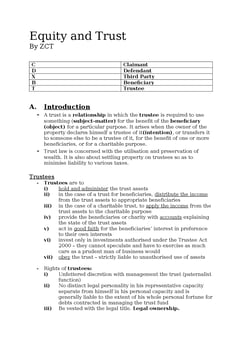Chinn v Hochstrasser [1981] 1 All ER 189
Judgement for the case Chinn v Hochstrasser
Table Of Contents
It may be enough for the transaction to contain an element of derivative bounty of the kind conferred by the exercise of a special power of appointment.
By a deed of settlement executed in 1960 the taxpayer's father settled shares in L Ltd. on discretionary trusts for the benefit of the taxpayer, his brother and their families.
In 1969, new trustees were appointed who appointed half each of the settlement shares to the taxpayer and his brother contingent on their surviving a period of three days.
Lord Roskill
It seem clear that if the particular transaction is a commercial transaction devoid of any element of what has been called "bounty" it is not within the section.
What the cases have sought to do is to distinguish between those cases where the recipient has in return for that benefit which he has received accepted some obligation, and those cases where the recipient benefits without any assumption by him of any correlative obligation.
-
The sole question here is whether there was the requisite element of "bounty" in this transaction so as to make it an "arrangement" within this subsection.
It was argued for the respondent that the settlor's "bounty" had been exhausted in 1960 when he created the settlement and that there was no exercise of "bounty" by the trustees as they possessed no beneficial interest in respect of which they could be bountiful.
-
Under this scheme there was an appointment without consideration.
Anthony was among the objects of the 1960 settlement but before the power of appointment was exercised there was no absolute certainty that Anthony would receive any of the shares held by the trustees.
There was a very real "bounty" conferred when the trustees with the settlor's consent exercised the power of appointment in question in Anthony's favour.
When the power of appointment was exercised a blank was filled in the original settlement which left blank how the final distribution of the trust's assets was to be made.
That was a clear act of "bounty."
For Further Study on Chinn v Hochstrasser

Taxation Law notes fully updated for recent exams at Oxford and Camb...
Need instant answers? Our AI exam tutor is here to help.
Ask questions 🙋 Get answers 📔 It's simple 👁️👄👁️
Our AI is educated by the highest scoring students across all subjects and schools. Join hundreds of your peers today.
Get StartedSimilar Cases
Related Product Samples
These product samples contain the same concepts we cover in this case.
| Tax Law | Income Tax Notes (12 pages) |
| Trusts and Equity | Trust Remedies Including Tracing Knowing Receipt Trust Dutiies And Powers And Equitable Damages Notes (60 pages) |

